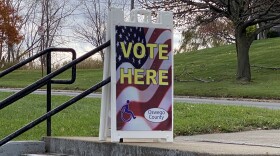Hundreds of thousands of mail-in ballots could be rejected this November because of mistakes, such as missing or mismatched signatures. Voter advocacy groups, political parties and others are rushing to help voters fix — or "cure" — their ballots before it's too late, so they can be counted.
Common Cause is one of many organizations actively calling voters in key battleground states, where even a small number of rejected ballots could make a big difference in the outcome of a close election.
Dana Abelson, who works with the nonpartisan group, spent hours last week calling voters in Florida whose ballots had been flagged because there was some problem with the signature. Either it was missing or didn't match the one election officials had on record for the voter.
"The good news is that you can fix it. It's super-easy and quick," Abelson told the voters, offering to walk them through the process online. In Florida, voters can cure their ballots simply by filling out and returning an affidavit along with a copy of an ID, such as a drivers' license.
"OK, that sounds wonderful," she tells one voter who promises to do just that. "Thank you so much for being an early voter, and I hope your ballot gets fixed."
More than 11,500 Florida ballots so far need to be cured, and the number is expected to rise much higher as an avalanche of mail-in ballots arrives there and in election offices across the United States.
In the 2016 presidential election, 318,728 mail-in ballots were rejected, largely because of signature problems and missed deadlines. But many more voters are voting by mail this year because of the coronavirus pandemic, raising the possibility of many more rejections. An NPR analysis this year found that more than half a million mail-in ballots were rejected in this year's primaries.
"We're not leaving anything to chance," said Adin Lenchner, deputy national states director for NextGen America, a group that mobilizes young voters to elect Democrats and progressives. The group now has dozens of volunteers actively trying to reach voters who need to cure their ballots.

Lenchner said his group spent a lot of time and energy getting these young voters to register, request their ballots and send them in. And it would be a shame if their votes didn't count simply because they made a mistake common among those who have never cast absentee ballots.
"It's confusing. You have to sign it in such and such a place and mark it just right," said Lenchner. "The process is confusing, especially if you're a first-time voter."
Michael Bitzer, a political scientist at Catawba College in North Carolina, has been tracking mail-in voting in his state. He said that so far, about 61% of the ballots that need to be fixed belong to Democrats, compared with 18% for Republicans. The rest are from unaffiliated voters.
Black voters also have a disproportionate share — about 40% — of deficient ballots. Bitzer noted that only 3% of these Black voters cast mail-in ballots in 2016, which means the process is new to many of them.
"Typically, the voter forgot to sign the back of the return envelope, or they failed to have the witness fully complete the section of witness information," he said.
North Carolina is one of a handful of states that require absentee voters to have a witness sign their ballot. But the state's ballot-curing process has also been tangled up in legal challenges for weeks, leaving voters confused and with little time left to fix any problems.
The state announced Monday that a legal dispute over the ballot-curing process – which had been on hold since Oct. 4 – has been resolved and county boards can start informing voters whose ballot need to be cured and how to go about doing that. Voters will either have to submit a new ballot or an affidavit, depending on the problem with their original ballot. The state estimates that about 10,000 voters will be affected.
"We're basically changing the rules of the game in the middle of the game," said Bitzer.
Similar legal fights are being waged in other states — only half of which allow voters to cure their mail-in ballots. If voters make mistakes in other states, they're out of luck and might not find out that their ballot didn't count until after the election.
Abelson, of Common Cause, said most people she calls are happy to hear from her because they are eager to have their votes count.
Florida is one of 18 states where election officials are required to inform voters if their mail-in ballots have errors, but it can take a few days.
Voter Isabelle Campbell, from Duval County, said she was surprised when she got Abelson's call: "Because I reviewed the instructions on the mail-in ballot and I made sure to really slowly go through it and do what I needed to do to get the ballot counted. So I'm still not sure what the issue is," said Campbell.
Still, she wasn't taking any chances. She had already filled out her affidavit to get her ballot cured.
"It's always important to vote, but I think this year is especially important to make our voices heard," said Campbell.
Abelson wasn't able to help everyone. One elderly woman said she was homebound and didn't have a computer. Abelson encouraged her to call the local election office, but the following day the woman told NPR she had yet to do so and was still confused about what to do.
Copyright 2021 NPR. To see more, visit https://www.npr.org.








